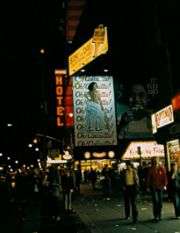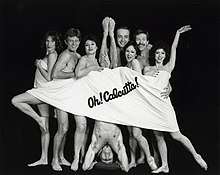Oh! Calcutta!
| Oh! Calcutta! | |
|---|---|
|
Oh! Calcutta! original soundtrack cover | |
| Music | Peter Schickele, Robert Dennis and Stanley Walden |
| Lyrics | Peter Schickele, Robert Dennis and Stanley Walden |
| Book | various |
| Productions |
1969 New York 1970 West End 1976 Broadway revival 1977 Madrid |
Oh! Calcutta! is an avant-garde theatrical revue, created by British drama critic Kenneth Tynan. The show, consisting of sketches on sex-related topics, debuted Off-Broadway in 1969 and then in the West End in 1970. It ran in London for over 3,900 performances, and in New York initially for 1,314. Revivals enjoyed even longer runs, including a Broadway revival that ran for 5,959 performances, making the show the longest-running revue in Broadway history at the time.
As of 2012, its revival was still the longest-running revue in Broadway history, the second longest-running revival, after Chicago, and the seventh longest-running Broadway show ever.
The show sparked considerable controversy at the time, because it featured extended scenes of total nudity, both male and female. The title is taken from a painting by Clovis Trouille, itself a pun on "O quel cul t'as!" French for "What an arse you have!".[1]
Background and productions
Tynan came up with the idea of putting on an erotic review in the summer of 1966.[2] Tynan had hoped that Harold Pinter would direct the production, in order to give it avant-garde legitimacy, but Pinter declined. Sketches were written by, amongst others, Nobel Prize winner Samuel Beckett, John Lennon, Sam Shepard, Leonard Melfi, Edna O'Brien, Jules Feiffer, and Tynan, and featured the cast naked. Peter Schickele (aka "PDQ Bach"), Robert Dennis and Stanley Walden were the revue's composers, known as The Open Window. Beckett's contribution, Breath, was used as a Prologue in the original New York staging, but Beckett eventually withdrew permission for its use.
The musical opened off-Broadway at the Eden Theatre on June 21, 1969, transferred to the Belasco Theatre on February 17, 1971, and closed on August 12, 1972 after a total of 1,314 performances. It was directed by Jacques Levy (later the songwriting partner of Bob Dylan on his album Desire) and choreographed by Margo Sappington. The cast included Raina Barrett, Mark Dempsey, Katie Drew-Wilkinson, Boni Enten, Bill Macy, Alan Rachins, Leon Russom, Margo Sappington, Nancy Tribush and George Welbes,[3] as well as the 3 "Open Window" composers.
The musical premiered in London on July 27, 1970 at The Roundhouse, and transferred to the West End Royalty Theatre on September 30, 1970, running through January 27, 1974. The show then transferred to the Duchess Theatre on January 28, 1974, where it ran until 1980, for a total of 3,918 performances.[4][5][6] The London show was produced by Michael White.[7][8]

A revival opened on Broadway at the Edison Theatre on September 24, 1976 and closed on August 6, 1989 after 5,959 performances, again directed and choreographed by Levy and Sappington. The revival briefly became the longest-running show in Broadway history. It remains Broadway's seventh longest-running show and the longest-running revue in Broadway history.[9]
A pay-per-view video production played on closed-circuit television in select cities in 1971, and was released theatrically in 1972; in both cases many cities and municipalities banned its showing. Frank Herold, an editor who worked on the film, provides commentary on this in a brief post he contributed to the project's Internet Movie Database page.[10]
The Spanish-language premiere production opened on October 9, 1977 at Teatro Principe in Madrid, Spain, directed by Juan Jose Alonso Millan, who also translated the show.
Sketches and songs
Note: the musical revue was in the form of sketches. These are taken from the 1971 production shown on pay-per-view. Lyrics and music by Robert Dennis, Peter Schickele and Stanley Walden (unless otherwise noted).
Act 1
- Prologue
- Samuel Beckett's "Breath" (until license withdrawn by author)
- Taking Off the Robe
The actors dance and remove their robes to the opening song ("Taking Off the Robe" (Oh! Calcutta!)).
- Jack and Jill
A boy and a girl who just met are in their own playland, with the boy constantly trying to find ways to seduce the girl who is afraid of him because he's a boy. The sketch ends with the girl in a coma after the boy rapes her ("Jack & Jill").
- A Suite of Five Letters
A song of five letters written by anonymous authors about their sexual preferences ("Suite for Five Letters"). Actually they were letters to the editor from various newspapers from olden times in London and later in the Suite, contemporary letters from sexual newspapers of the day.
- Dick and Jane
An uptight girl gets a lesson in loosening up after her lover is sick of her constantly stiff ways ("Dick & Jane").
- Will Answer All Serious Replies
A young couple start to rethink getting into the swingers lifestyle after meeting the middle-aged couple who answer their ad ("(Will Answer All) Sincere Replies").
- Delicious Indignities
A chaste woman is caught by her admirer, who then proceeds to learn that she isn't as chaste as he thinks she is ("Delicious Indignities (or The Deflowering of Helen Axminster") was written by Sherman Yellen).
- Was It Good for You, Too?
A man participates in a sex study and the whole experience ends up turning into one big farce ("Was It Good For You Too? (Green Pants, I Like the Look)"). The scene plays like the Marx Brothers at a sex research facility.
Act 2
- "Who, Whom (Exchanges of Information)" (Added during run)
- Life Is Over Much Too Soon
A pre-filmed section, where the actors are nude outside doing interpretive dance ("Much Too Soon"), music and lyrics by Jacques Levy, Dennis, Schickele, and Walden.
- One on One
Another nude interpretive dance ("One on One (Clarence and Mildred)").
- Rock Garden
After a man rambles on about painting the fence and building a rock garden, his son talks about what girls really like ("Rock Garden").
- Four in Hand
A newcomer to a masturbation game can't seem to think of anything to masturbate to ("Four in Hand"). (The first draft of this sketch was written by John Lennon.)[11][12]
- Finale
Players come out to sing the final song and dance, also doing voiceover as to what the theater patrons are really thinking about the experience. Examples include: "She has pretty eyes" (the joke being that all of the actors are nude at this point), "How come none of the guys have hard-ons?" "That's my boyfriend—that IS a hard-on", and "If they showed this in Washington, Agnew would shit!" ("Coming Together, Going Together").
Critical response
Clive Barnes, in his 1969 New York Times review, wrote that "the humor is so doggedly sophomoric and soporific", adding "The failure here is almost exclusively a failure of the writers and the producers. The director, Jacques Levy, has done his best with the weak material at hand ... the nude scenes, while derivative, are attractive enough. The best effects — including the rather sweet grope-in immediately after the intermission — have been taken from Robert Joffrey's ballet 'Astarte', and the show uses the same projected media designers ... In sum, 'Oh! Calcutta!' is likely to disappoint different people in different ways, but disappointment is the order of the night."[13]
Irving Wardle, writing in The Times in 1970, said: "I have seen better revues than Oh! Calcutta! but none based on ideas that strike me as more sympathetic. Namely that the ordinary human body is an object well worth attention: and that there is no reason why the public treatment of sex should not be extended to take in not only lyricism and personal emotion but also the rich harvest of bawdy jokes." He noted that the enjoyment and lack of embarrassment of the cast helped the audience to accept the more insubstantial elements of the review's material and that the stage sets' screen projections assisted the dance numbers considerably, concluding: "In many ways it is a ghastly show: ill-written, juvenile, and attention-seeking. But it is not a menace".[14]
Obscenity allegations
The 1970 Roundhouse, London production attracted the attention of the Metropolitan Police's Obscene Publications Squad, which sent two officers to a preview of the show. One of the officers returned twice more before recommending a prosecution under the 1968 Theatres Act for obscenity. The Director of Public Prosecutions sent its panel of experts — including two retired headmistresses — to see the Roundhouse production and their judgement that it was not obscene enabled it to transfer to London's West End.[15]
See also
- Oh! Calcutta!, The Lawrence Arms album
- Fictional character CJ Tingler, who appeared in the play.
References
- ↑ Clovis Trouille's portrait of a reclining nude shown from behind entitled "Oh Calcutta, Calcutta!" - a pun in French - was chosen as the title for the 1969 musical revue. (The French phrase "oh quel cul t'as" translates roughly as "oh what a lovely arse you have".)
- ↑ Tynan, Kathleen (editor) Kenneth Tynan Letters, London, Weidenfeld and Nicolson, 1994
- ↑ Front piece, OH! CALCUTTA!, Copyright 1969 by Grove Press, Inc.
- ↑ Oh!Calcutta! listing guidetomusicaltheatre.com, accessed July 31, 2009
- ↑ Oh Calcutta West End listing broadwayworld.com, accessed July 31, 2009
- ↑ Duchess Theatre history duchess-theatre.co.uk, accessed July 31, 2009
- ↑ Walsh, John (23 October 2011). "John Walsh meets... Michael White, sultan of swingers". The Independent. Independent Digital News and Media Ltd. Retrieved 3 September 2016.
- ↑ Roberts, Lesley (3 November 2013). "New movie reveals life of producer and playboy Michael White who was secret king of showbiz in Scotland". Daily Record. Scottish Daily Record and Sunday Mail Ltd. Retrieved 3 September 2016.
- ↑ Rich, Frank."The Asterisks of Oh Calcutta" New York Times, August 8, 1989
- ↑ Oh! Calcutta! imdb.com
- ↑ ibdb.com
- ↑ "Lennon Lore & Legacy: Oh! Calcutta!". Absolute Elsewhere: The Spirit Of John Lennon. Retrieved 1 August 2017.
- ↑ Barnes, Clive. "Theater: 'Oh, Calcutta!' a Most Innocent Dirty Show". The New York Times, June 18, 1969.
- ↑ Wardle, Irving (28 July 1970). "Sometimes funny – not a menace". The Times (57929). Times Newspapers Limited.
- ↑ Travis, Alan (23 December 2000). "How two dames saved Oh! Calcutta!". The Guardian. Retrieved 19 November 2015.
External links
- Oh, Calcutta! — June 17, 1969 original (Internet Broadway Database)
- Oh, Calcutta! — Sept 24, 1976 revival (Internet Broadway Database)
- Oh, Calcutta! — film of 1969 original (IMDb)
- Review of DVD release on DVD Verdict
- BroadwayWorld listing
